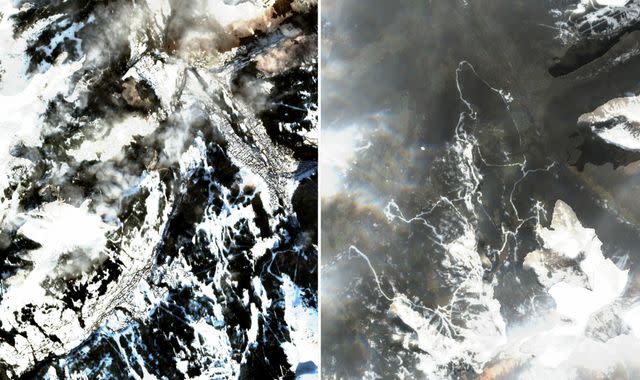Satellite images show dramatic lack of snow in ski resorts as heat in Europe 'annihilates' records

Striking satellite images have revealed dirty brown hillsides around what should be pristine, white snow-covered ski resorts as record-breaking January heat hits all over Europe.
Sparse snowfall and unusually warm winter weather have disappointed ski slope operators and holidaymakers hoping for a white winter getaway to some of Europe's lower-lying mountain resorts.
Instead they are facing patches of grass, rock and dirt, with some resorts forced to close.
Many countries have already smashed new January temperature records as a wave-like pattern in the jet stream brought warm air from further south, exacerbated by global heating by humans.
A weather station in Delemont, in the Jura range on the French border, already set a new January temperature record of 18.1C (nearly 65F) on the first day of the year, over 2.5 degrees Celsius higher than the previous figure.
Professor Liz Bentley, chief executive of the Royal Meteorological Society, said: "There are eight countries across Europe that have broken their January record and a couple of them have absolutely annihilated them - not just by a few [tenths of] degrees.
"In Poland, it's smashed that record by four degrees. That's a huge amount."
Warsaw, the Polish capital, saw 18.9C (66F) on Sunday, 4C higher than the previous average. The other countries with new January records are Belarus, Czechia, Denmark, Liechtenstein, Lithuania, Latvia, and Netherlands.
The unseasonally high temperatures follow a record-breaking summer of heat in Europe, and a record year for the UK.
Read more: Seven of the extreme weather records broken in 2022
But the fallout from extreme heat in winter is very different to summer, said Prof Bentley.
In the summer months, extreme heat would bring a "dramatic increase in the mortality rate," she said.
But in winters, "impacts are more to do with the impact on the ski industry - so, a shortage of snow - and on water supplies - so, vanishing glaciers - but also water shortages, extended droughts because of the increased evaporation from the high temperatures."
While slopes above 2,000 meters have received snow, in lower-altitude Morzine there are currently only two runs open, while Ax 3 Domaines was forced closed on Saturday after only a few weeks.
Prof Bentley said there's "a lot of confidence" that climate change is making such extreme heat events happen more often and breaking more records.
"And they tend to be more prolonged events where they don't just last a few days, they can last for weeks on end."
Click to subscribe to ClimateCast wherever you get your podcasts
Watch the Daily Climate Show at 3.30pm Monday to Friday, and The Climate Show with Tom Heap on Saturday and Sunday at 3.30pm and 7.30pm.
All on Sky News, on the Sky News website and app, on YouTube and Twitter.
The show investigates how global warming is changing our landscape and highlights solutions to the crisis.

 Yahoo News
Yahoo News 
